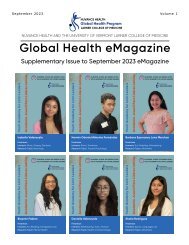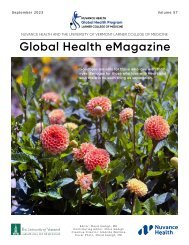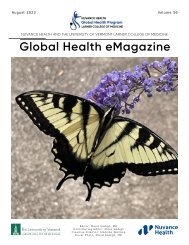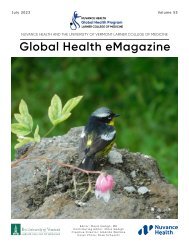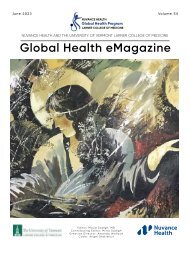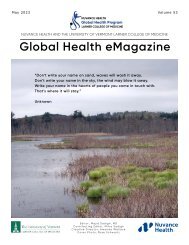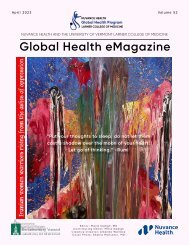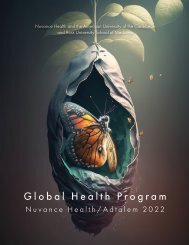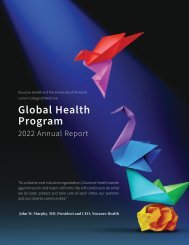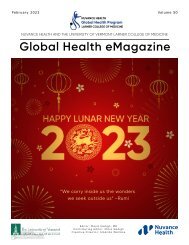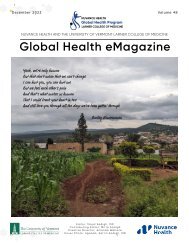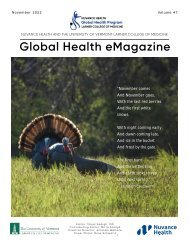April_eMagazine Volume 40
You also want an ePaper? Increase the reach of your titles
YUMPU automatically turns print PDFs into web optimized ePapers that Google loves.
OUR PEOPLE,<br />
OUR MISSION<br />
Women’s Health Education<br />
Postpartum Depression<br />
Written by Sarah Cordisco<br />
Global Health<br />
<strong>eMagazine</strong><br />
<strong>April</strong> 2022<br />
Watch this video!!<br />
Bani Adam by Saadi Shirazi<br />
Senior Nursing Student at the University of Vermont<br />
Postpartum depression is a major health concern in all countries<br />
and is the most common mental health problem in the postnatal<br />
period. Generally, postpartum depression (PPD) occurs four<br />
to six weeks after childbirth, with symptoms similar to major<br />
depressive disorder. These symptoms include “depressed mood,<br />
loss of interest or pleasure in activities, sleep disturbance,<br />
appetite disturbance, loss of energy, feelings of worthlessness or<br />
guilt, diminished concentration, irritability, anxiety, and thoughts of suicide” (Slomian et al., 2019).<br />
Many women may experience a phenomenon called “baby blues,” a transient, self-limiting mood<br />
disorder that begins two to three days after birth and resolves within two weeks. Both postpartum<br />
depression and baby blues occur from the sudden drop and change in estrogen and progesterone<br />
after having a baby. In addition to hormonal changes, the role and life changes that occur after<br />
add additional stress that can affect mental health.<br />
Highlights<br />
Perspectives<br />
Behind the Scenes<br />
Announcements<br />
Spotlight<br />
On average, PPD affects about one in five women, although this statistic varies from country to<br />
country. In higher-income countries, the prevalence of PPD varies from 10-15% in the first year after<br />
birth while in lower and lower middle-income countries the prevalence is around 18.6% (Wang et al.,<br />
2021), although some studies have shown these numbers to be up to 60% of the population. Southern<br />
Africa has been seen to have the highest prevalence rate at 39.96%, followed by Southern Asia with<br />
22.32%, South American at 21.71%, Western Asia at 19.83% and Northern Africa at 18.75% (Wang et al.,<br />
2021). These numbers are likely significantly higher, as not everyone reports their symptoms. Some<br />
mothers may not report due to the fear of being judged for their symptoms or for not bonding<br />
with their baby as easily. Others may be unaware that this condition exists and fail to mention<br />
their feelings to their healthcare providers. The rate of this mental health disorder is also affected<br />
by other factors such as “marital status, education level, social support, spouse care, violence,<br />
gestational age, breastfeeding, child mortality, pregnancy plan, financial difficulties, partnership,<br />
life stress, smoking, alcohol intake, and living conditions” (Wang et al., 2021).<br />
Reflections<br />
Nursing Division<br />
SARS COV-2 Pandemic<br />
and Us<br />
Clinical Case Report<br />
A New Column<br />
Global Health and the Arts<br />
Articles of the Month<br />
Videos of the Month<br />
When dealing with PPD, women need a lot of support and must develop coping strategies. Coping<br />
is the cognitive and behavior process that a person uses to deal with stressful circumstances that<br />
are demanding, challenging, threatening, or have a potential for harm or loss. Coping styles are<br />
broken into three categories: problem-focused, emotion-focused, and dysfunction or avoidance<br />
coping. Problem-focused coping involves the person dealing with the source of the stress, whereas<br />
emotion-focused coping is when the person attempts to handle the thoughts and feelings<br />
associated with the stressor. Dysfunctional or avoidant coping is a strategy in which a person<br />
avoids dealing with both the stressor and the emotions associated (Azale et al., 2018). While coping<br />
strategies vary from culture to culture, it is important that postpartum women develop coping<br />
mechanisms that will be healthy and beneficial to their mental health. They must have a support<br />
system which may consist of family, friends, or community. Many women may also find spirituality or<br />
religion to be very beneficial when dealing with postpartum depression. It is important that women<br />
identify their own support systems and where they can turn to when experiencing these feelings.<br />
They must be encouraged to talk about their feelings and emotions after having a baby without<br />
shame or judgment from others.<br />
In the next article I would like to talk about women’s rights and the differences we see across the<br />
globe, as well as different women’s activist groups. If anyone has anything to share or questions to<br />
ask about any topic I write about, please feel free to email me at: sarah.cordisco@gmail.com<br />
Calendar<br />
Resources<br />
References<br />
Azale, T., Fekadu, A., Medhin, G., & Hanlon, C. (2018). Coping strategies of women with postpartum depression symptoms in<br />
rural Ethiopia: A cross-sectional community study. BMC Psychiatry, 18(1), 41. https://doi.org/10.1186/s12888-018-1624-z<br />
Slomian, J., Honvo, G., Emonts, P., Reginster, J.-Y., & Bruyère, O. (2019). Consequences of maternal postpartum<br />
depression: A systematic review of maternal and infant outcomes. Women’s Health, 15, 174550651984<strong>40</strong>44. https://doi.<br />
org/10.1177/174550651984<strong>40</strong>44<br />
Wang, Z., Liu, J., Shuai, H., Cai, Z., Fu, X., Liu, Y., Xiao, X., Zhang, W., Krabbendam, E., Liu, S., Liu, Z., Li, Z., & Yang, B. X. (2021).<br />
Mapping global prevalence of depression among postpartum women. Translational Psychiatry, 11(1), 1–13. https://doi.<br />
org/10.1038/s41398-021-01663-6<br />
Nursing continued on next page >><br />
23




